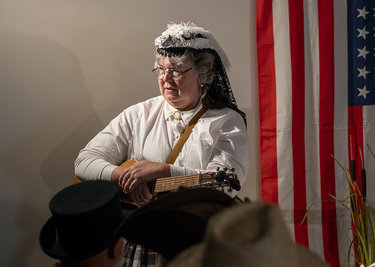It takes a village to share a history
KNOX — Voices from the past called out to the present in Knox on Sunday.
As part of the town’s bicentennial celebration, Paula Shafer Sisson wrote a play, “Anti-Rent War Voices Echoing Through the Helleberghs.”
The definitive book on the uprising, “Tin Horns and Calico: A Decisive Episode in the Emergence of Democracy,” was written in 1945 by Henry Christman. He had grown up on a farm abutting the Helderbergs, which is now a preserve. His father, Will Christman, was a farmer and poet and his brother, Lansing Christman, also a poet and a pioneer in television news, was a one-time editor of The Altamont Enterprise.
Henry Christman’s work covers such a significant part of Hilltown history that it’s even sourced in town documents like Knox’s comprehensive plan.
The Dutch used a semi-feudal system in settling the lands around Albany, Christman’s book explains. Farmers were bound to their landlords, the patroons, by a lease written by Alexander Hamilton, which served for decades.
But, after the American Revolution, the task of paying rents didn’t sit well with descendants of those revolutionary soldiers who had inherited rights to farm the Helderberg lands from their fathers. The Hamiltonian idea of a privileged upper class had fallen out of fashion.
The Anti-Rent Wars began in the 1840s in 11 different counties in the Capital Region, when farmers refused to pay the rent they owed on their farms. One of the first meetings of farmers who no longer wanted to pay to farm the land they lived on occurred in Berne.
Years of skirmishes between farmers and the sheriff’s deputies enforcing the rent contracts along with legal skirmishes and political battles eventually led, in 1862, to the passage of the federal Homestead Act, which opened western lands to settlers and led to the birth of Abraham Lincoln’s Republican Party.
While there have been many books, songs, and plays, even a film, about the Anti-Rent Wars, Saturday’s play was uniquely personal.
One of the voices was that of Paul Shafer Sisson’s great-grandmother, Elizabeth Ann Saddlemire — a part the playwright herself played.
Another voice was that of her great-great-grandfather, Amos Saddlemire, portrayed by husband, Bernard Sisson.
Malachi Whipple was portrayed by his great-great-great-great-grandson, Brian Whipple, while Amos Whipple was portrayed by his great-great-great grandson, David Whipple.
The list goes on.
The play, which took place in the modern Knox Town Hall, had as a backdrop a hand-hewn barn door frame made by Knox resident Dana Sherman and his son, Daniel — of ax-throwing fame.
Before the play, the Shermans gave a living-history demonstration showing what lumber was like in the mid-1800s when the Anti-Rent Wars were being waged.
Participants were also treated to traditional food, passed out in lunch pails. Chicken and beef were served with coleslaw and cheese topped off with ginger molasses cookies.
The sold-out audience was asked to join in the songs: the original “Landlord’s Lament,” along with the folk classic made famous by the late Pete Seeger, “Big Bill Snyder,” and, of course, the Civil War standard, written by abolitionist Julia Ward Howe, the “Battle Hymn of the Republic.”
Seeger had talked to The Enterprise about “Big Bill Snyder” for an earlier Hilltown play on the Anti-Rent Wars.
“One of the extraordinary parts of America, which usually is skipped or skimmed over in American history courses,” Seeger said, “is the way American history has been formed, not always by the presidents and the officials, but by the rank and file people who kept pushing.”
“The politician,” said Seeger, “can go only so far as the people will follow him.” About the Anti-Rent Wars, he went on, “So now here’s a case where the New York State constitution needs some changing. And, how is it going to be changed?”
He answered himself, “If it hadn’t been for the agitation of these people, it probably wouldn’t have changed ….”
The real-life descendents of those rebels portrayed their history on Saturday.
And Peter Lindemann, wearing his trademark top hat, pulled the local history together with the national as he portrayed Abraham Lincoln in the play, giving a speech that touched on the Civil War and placed the Homestead Act in a larger context.
The production was filmed by Knox resident Nicholas Viscio so that residents can continue to learn from their history.
****
This weekend will be the apex of Knox’s year-long bicentennial celebration, festivities led by the bicentennial committee’s chairman, Dennis Barber.
Kicking off the celebration in March, Barber had recounted some of the town’s history. Before the original German Palatine settlers arrived in Knox in the mid-1700s, the land was home to Algonquin and Iroquois tribes, and, according to the town’s comprehensive plan, “Prior to 1790, the Town was known only as a wild, mountainous part of the West Manor of Rensselaerswyck,” referring to the Dutch patroon Stephen Van Rensselaer.
Barber said the town was established by the New York State Assembly in 1822, through the Act to Divide the Town of Berne in Albany County, and named after General Henry Knox, who, after his command in the Revolutionary War, had been named the United States’ first secretary of war by George Washington, to whom he had been a close advisor.
“Most people were farmers growing crops,” Barber said, “such as winter wheat, oats, corn, potatoes, tobacco, apples, and barley,” adding that, in 1874, there were “874 cows, 644 horses, and 4,100 sheep.”
Forms of industry included sawmills, blacksmith shops, harness-makers, a grist mill, shoemakers, a few doctors, and “one lawyer,” Barber said, in addition to the town’s claim to fame — pillbox makers.
The pillbox industry lasted in Knox from 1806 to 1906, Barber said, and, in that century, “local families would make approximately 60,000 pillboxes each year.” This earned the town its title of Pillbox Capital of the World.
In 1850, the town had its first one-room schoolhouse; by 1886, Knox had 13 schools, Barber said; teachers were paid $13 per month. Two of the school houses still stand: One is where it was built on Ketchum Road, in Knox, and the other, built along the Bozenkill, was moved to the Altamont fairgrounds, in Altamont.
The town also used to be home to hotels, restaurants, and bars.
“Today, I would describe Knox as a bedroom community,” Barber said, “because most people work off the Hill and do their shopping on their way home from work. With the invention of the automobile, the town no longer had to be self-sufficient … Knox is, and always has been,” Barber concluded, “a great place to grow up.”
This Friday, Aug. 5, the Knox Bicentennial Chicken Barbecue will be held at the Knox Reformed Church at 2175 Berne-Altamont Road, from 3:30 to 6 p.m. or until sold out.
The church had hosted, for more than a century, an Election Day dinner where Democrats and Republicans alike would eat harmoniously together.
On Saturday, Aug. 6, men who have been growing beards to honor their ancestors will compete in a contest where their whiskers will be judged for prizes. A car show will display classics from the past and live music will be provided by Geezer, Nite Train, and Bluestones. Fireworks at dusk will cap off the celebration.
— Melissa Hale-Spencer


